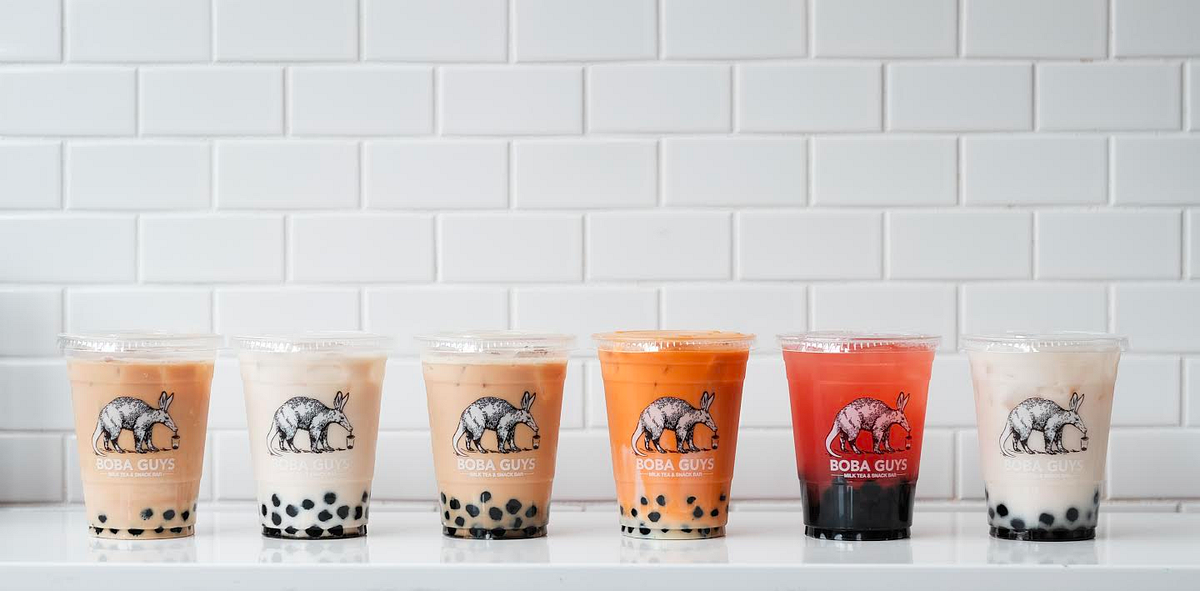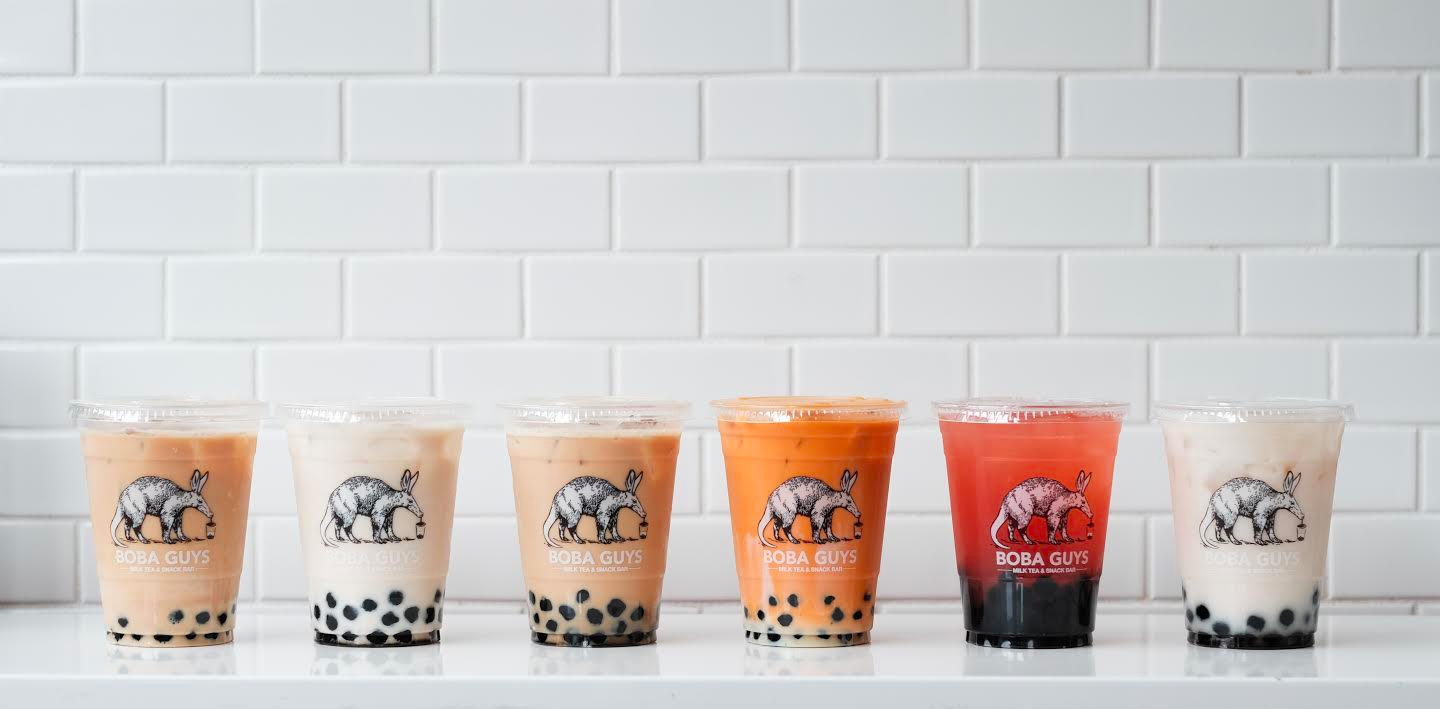
It’s 10:40 a.m. on a Thursday. The intersection of Octavia and Haight is already clogged with cars, and I consider purposefully dawdling because I’m 20 minutes early for my interview with the founders of Boba Guys. I don’t want to enter the premises early, not just because it’s awkward, but because I know that the tapioca “pearls” aren’t ready until 11:00 a.m. — and I’m committed to ordering the same drink every time. It requires balls. Twelve ounces, hot lychee green tea, almond milk and 25 percent sweetness.
The Boba Guys’ backstory is nearly ubiquitous to both boba aficionados and digital-periodical addicts, but I will recount it here. Andrew Chau and Bin Chen met when they both worked at Timbuk2 and quickly became friends. The two chatted and ideated at a local boba-tea shop while slurping on the sweet, milky, pearl-filled drink of their childhood but were taken aback when their local shop closed its doors. They endeavored to make their own boba and took to YouTube to study techniques for making the perfect cup of boba tea. Research yielded little quality information. Most boba shops use powders to create drinks that Bin describes as “too indulgent,” and grocery stores sell ingredients that produce only, in his words, “garbage.”
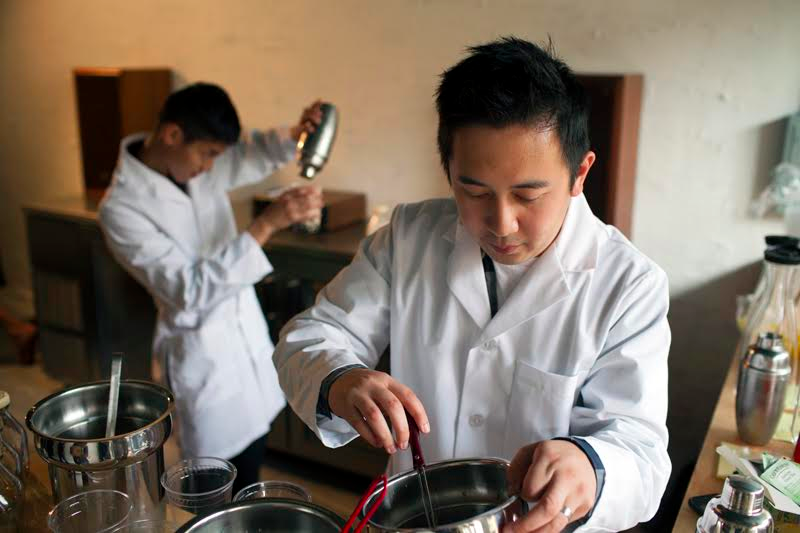
In 2011, after much careful study, Bin and Andrew nailed a winning recipe and set up a pop-up stand in their friend’s restaurant, Ken Ken Ramen, donning white lab coats while at work to pay homage to the chemistry of their adventure. Also, Breaking Bad. This marriage was fortuitous, and the rest is history.
It’s been five years since Boba Guys’ “grade-A balls” arrived in San Francisco. What has happened in the interim?
“I’ve been up since 6:30.” This is Bin’s response when I ask him why he doesn’t have a drink in hand.
“I already had two cups of coffee.”
We’re sitting quietly at a table in the corner by a sliding door that separates the shop from Tea People, a partnered tea provider also founded by the Boba Guys team. Bin is spindly and long limbed, wearing a “Boba Bae” pullover that feels both out of place for its informality and completely on-brand. His occasional chuckle does little to temper his apparently shy demeanor. His vague discomfort is explained in four words: “Andrew isn’t here yet.”
Andrew is the outspoken member of the pair. He’s also the analytical and business arm of the outfit, while Bin heads up the design and right-brain type activities — though both hail from a digital and corporate marketing background. The transition to the food industry was unexpected for both of them, upstaging their previously unexpected transition into the marketing industry a decade prior. Andrew was studying medicine, and Bin was heading toward a computer science degree. Their Taiwanese parents were unenthused by their initial career changes and even more unenthused when they entered the food industry, a place their parents had asked them to never return to. Luckily for us, they made the leap.
At first, Bin qualifies his answers with “Andrew should be here soon” and “Andrew would explain this well” before opening up and answering more freely. His sense of humor is both obfuscating and witty. When asked about Boba Guys’ anteater mascot, he offers, “He’s our spirit animal.” Expecting more from the graphic designer and creative blog curator, I push harder. “His mouth has a built-in straw,” he adds. We mull over the metaphorical extension of ants to tapioca balls before he balks at the mental image and relents: “Truthfully, the anteater wasn’t anyone else’s intellectual property.”
Andrew walks in moments later through the back entrance, seemingly oblivious to the interview. He’s dressed in the urban San Francisco uniform — a beanie, sneakers and a leather jacket — and his face looks as if it permanently bears a smile. He only utters, “Oh, Bin’s got this. You don’t need me,” before walking in the opposite direction. Bin looks uncomfortable, and I quickly interject, “No, I need both of your perspectives.” He turns back mid-step and sits down at our table.
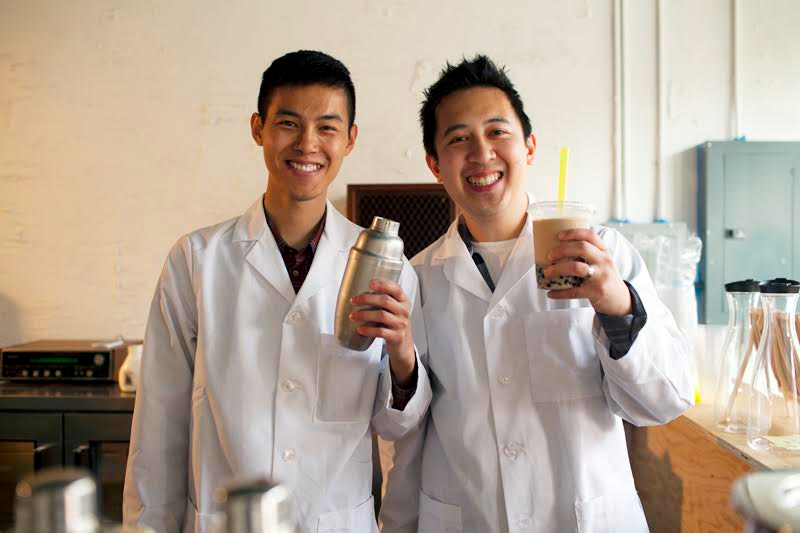
Only after I see them together do I understand Bin’s hesitations about speaking with me alone. Andrew’s presence unleashes an alternative, complementary behavior in Bin. They call themselves Kirk and Spock. Now there is a snappy repartee in the telling of stories that can arise only when one party unbashfully compliments the other. It’s particularly funny because both men are so humble and self-effacing, and neither of them can take a compliment. They’re fully aware of this, though only one of them capitalizes on it as a source of humor. “It’s like a marriage,” Andrew volunteers, cracking jokes about the two spending enough time together to be a couple. His wife is even in on the joke. Andrew recounts the time his wife asked the pair, “Five years in, do you appreciate each other more now?”
“I’ve never said this to Bin, but I’ll say it in front of you,” Andrew responds, turning to back to face his cofounder. “Bin, after five years, I just know this is working. Also, you remind me a lot of the woman I chose to spend the rest of my life with.”
At this juncture, I also learned why Bin was awake at 6:30 a.m. This is the last day in their series of gift-card giveaways, and they decided to raise the stakes by planting $100 at the top of Twin Peaks. A number of $20 gift certificates would also be hidden along Pier 39, the location that the two assumed would receive more foot traffic. Apparently, Twin Peaks was saturated with overachievers, and no one came to Pier 39. Andrew was stuck sitting in the cold, alone, for hours.
Andrew and Bin had founded previous companies, but none of them gave the two a sense of fulfillment. Now, with Boba Guys, they’re finally creating a product they care about. They happily accept the accolade “The Blue Bottle of Boba,” which makes sense — in building the business, the two studied third-wave, artisanal coffee shops in the city, aiming to “take a successful model and pivot one degree.” They’re not trying to reinvent the Taiwanese boba-tea shop; rather, they’re bridging cultures. As much as “east meets west” is a hackneyed phrase, here it is accurate.
The appearance of brick-and-mortar shops in Hayes Valley, the Mission, Union Square and, now, New York City is a testament to the growing success of their product. But artisanal boba is still a product that could thrive to this degree only in cosmopolitan places like New York City and San Francisco, which have their share of foodie culture. The Hayes Valley flagship matches the neighborhood’s aesthetic: white walled, with Scandinavian- and Japanese-inspired minimalism.This is, by all accounts, the most San Francisco boba to have ever San Francisco’d.
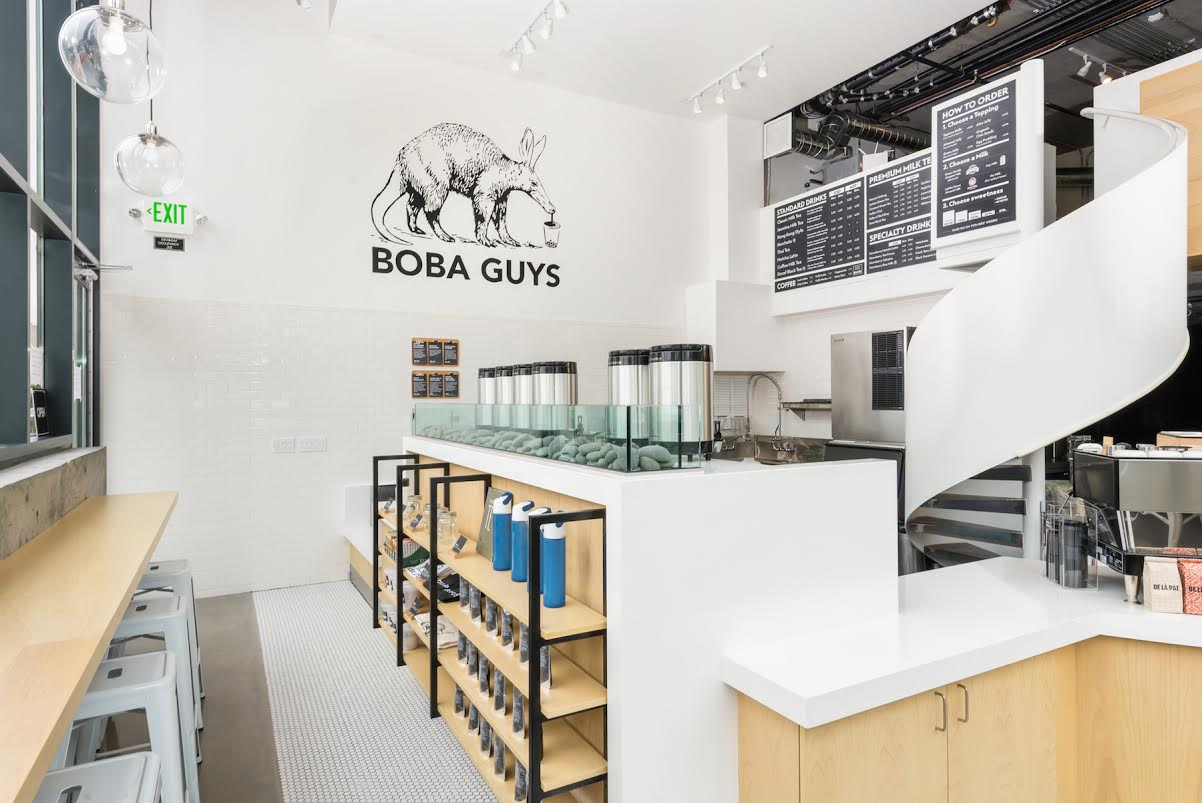
But the founding story runs counter to the traditional Silicon Valley success story. Andrew and Bin never accepted venture-capital funding, though they spent time seriously considering offers. Instead, they took out a small loan (under $200K) and contributed $40K each of their own money, out of pocket. The two are so wildly risk-averse that they did not even quit their full-time jobs until three years into the project. They finally left their marketing jobs to “find meaning,” because “having one person recognize Boba Guys feels more impressive than having millions watch your commercials on TV.” They regularly cite Patagonia as their favorite brand; they’re aiming to build a “100-year company.”
High among the priority of Boba Guys is transparency. Andrew points out the number of “shitty Instagram posts,” some of which are hazy or off-center. He offers a blasé critique of his double chin, as if to prove his commitment to authenticity over perfection. With two decades of collective marketing experience, the pair undoubtedly could — and often will — produce spotless editorial work. But social media isn’t where that work will be found. As Bin explains, “We keep the website and the storefronts looking professional because it’s the consumer’s first touch point. But if you’re following us on social media, that means there’s already a level of commitment. We want you to know we’re real people.”
Bin and Andrew’s results have been good and bad. When dressed in Boba Guys garb, people will recognize them as “the Boba Guys” in cities from New York City to Seattle. They’re even known in Taiwan as “those guys who are making Taiwanese drinks famous in America.” They’re highly responsive — I got in contact with them via a Twitter direct message. But their responsiveness has also gifted them a stalker, who takes their photos and draws red X’s over their eyes. Bin seems antsy and displeased about this. Andrew’s comment: “I think it’s sort of cool. It proves that we’re doing a good job of being real. And they’re artsy? I guess.”
Even better are the bizarrely vitriolic emails the founders receive. The Internet has ushered in an age of hate-mail egalitarianism. The two keep an email folder containing the gems, which include “Your tea is complete shit” and “You’re so pretentious to call your ingredients ‘high quality.’ You guys are just snobs to other places.”
Andrew’s response to the haters: “The business side of Boba Guys has to be serious — that’s how we make a living, after all, but I don’t know why people take it so seriously. We’re just making boba.”
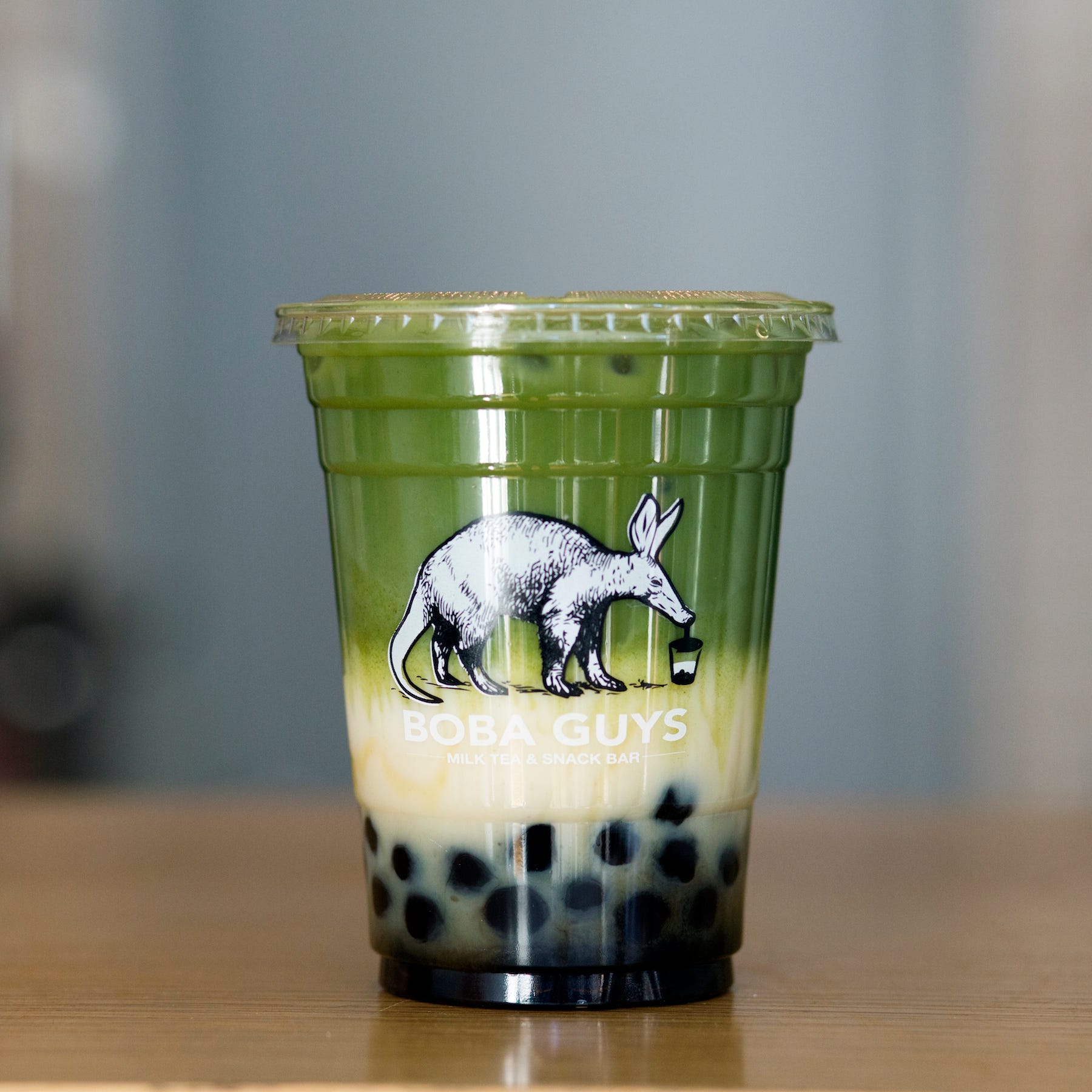
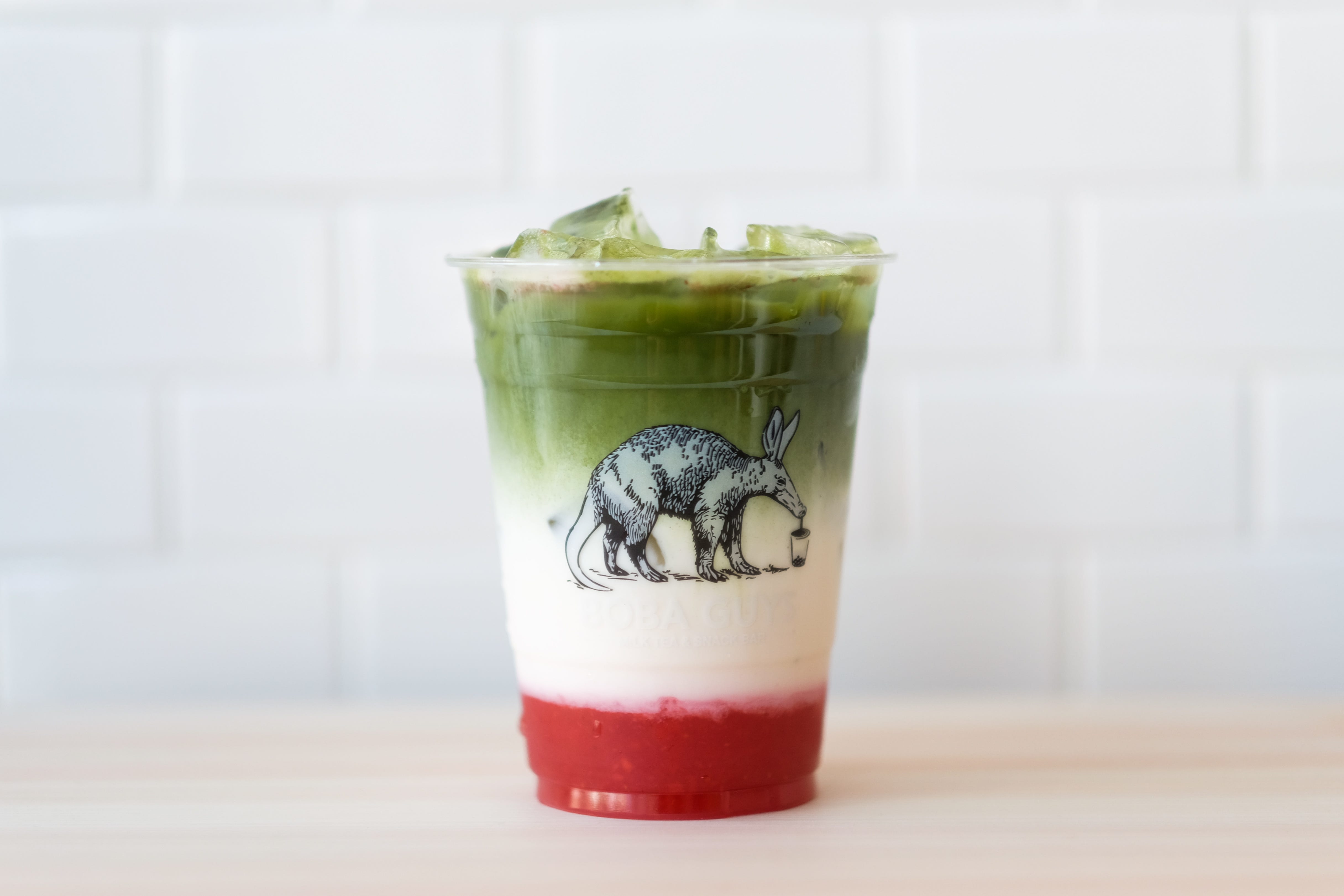
The more I engage with the duo, the more I realize how every detail of the shops is an extension of its founders, like the dedication to sustainability, local sourcing and environmentally friendly materials. Andrew and Bin pay a starting salary above both minimum wage and the going rate for entry-level barista jobs. They once offered money out of their own wallets to a homeless man who tried to steal the tip jar. The homeless man was so touched by the owners’ dedication to protecting their employees’ tip earnings that he asked for a hug — Andrew gave the hug, and Bin spectated. “I stood guard,” he clarifies.
The business side of Boba Guys has to be serious — that’s how we make a living, after all, but I don’t know why people take it so seriously. We’re just making boba.
This “culture” also shakes out in extremely granular ways. Specific eccentricities of their childhoods that initially bonded Andrew and Bin remain in the storefronts themselves. The two were raised frugally — you know, the kind of parents who save money by telling their kids to put on a jacket instead of turning on the heater. Unconsciously, they incorporated this lesson into their management style until one of their employees started coming to work in a fur-hooded parka. After that they turned on the heat.
These are the stories normal passersby would never anticipate, the stories that beat reportage doesn’t authentically capture. Nowhere in the recounting of the founding story does the layman get to hear Andrew’s lilting description of watching “awkward first dates” and “catering engagement parties.” We don’t get to see Bin’s smirk in the layout of chronology. “So many reporters already come with the story in their mind,” he explains, “and ask questions to corner us into forming their conclusion.” In my mind, that cheats any opportunity for surprise. And often these surprises are where you find the real story, where you mine someone’s actual personality.
After chatting for an hour and a half, the interviewer-interviewee façade has toppled. We talk candidly about growing up as lower-middle-class children of immigrants and gush about our favorite foods. Andrew describes the horchata boba as a love letter to the Mission, a callback to his childhood in South San Francisco. “A lot of people complain that it’s not authentic,” Andrew says, “but it’s the perfect bridge between the cultures of my childhood.”
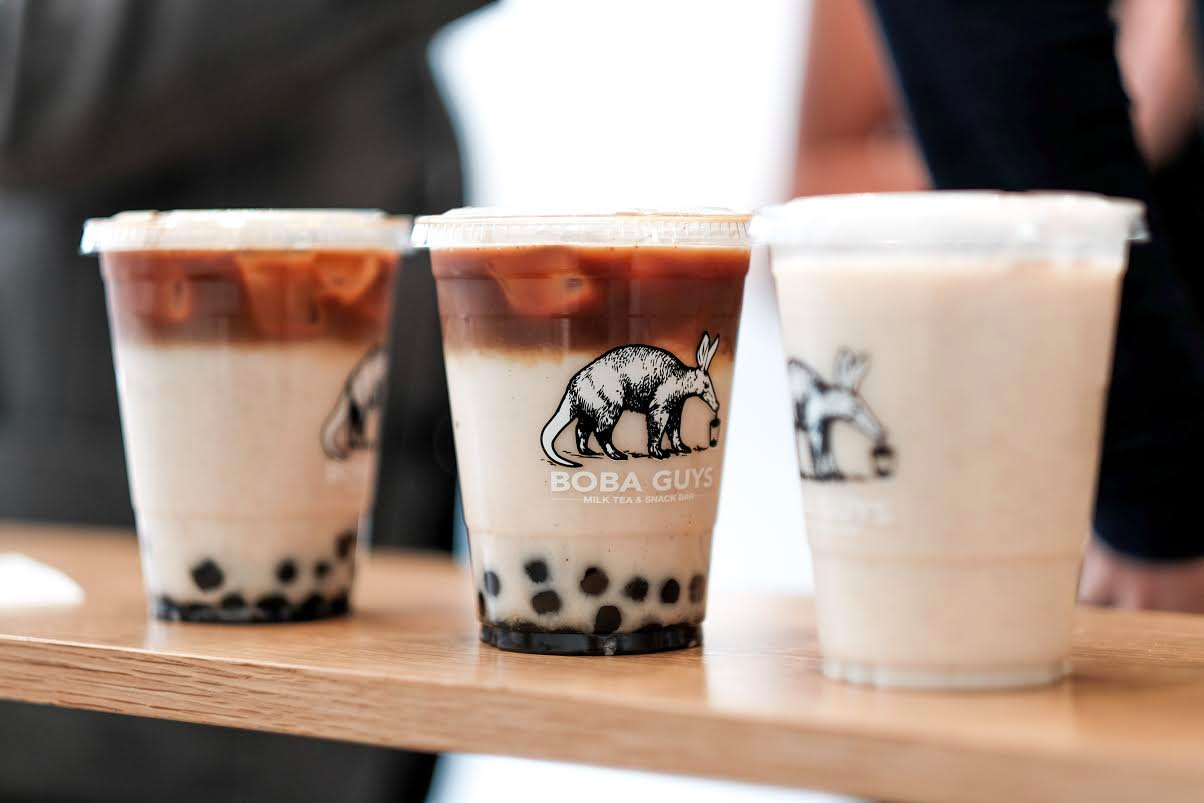
I ask again about the origin of the gift-card giveaway. They divulge, like excited teenage boys, how much they love the scene in The Dark Knight where Batman is given the choice of whom to kill and whom to save. At this point, Bin interrupts with “It’s Christmas. We couldn’t make it that morbid.” And Andrew replies, “So we decided to hide things for people instead.”
Andrew recounts his feeling of utter desolation while sitting alone at Pier 39, five $20 gift certificates in hand, while Bin was accosted by women in pajamas who had arrived early to find the gift cards at the top of Twin Peaks. “It’s a good thing I had backups,” Bin explains. “I didn’t want to disappoint anyone.” Before Andrew can parlay, Bin continues, “And because I was already up there, I figured I might as well do some bird watching.”
This, I was not expecting. “You’re into ornithology?”
“Well, this app makes it so easy.”
Bin whips out his phone and opens his new bird-watching app, which, he explains, applies artificial intelligence to recognize bird pictures. Andrew smirks. “See, Bin is such a mystery, I don’t even get to know about his new hobbies. He just puts it on his Instagram story, and in the middle of watching him making boba and answering questions, I’ll see a five-second riff of Bob Dylan on the harmonica. And then it’s back to Boba Guys work.”
“It’s literally only five seconds,” Andrew says again, as if to confirm its mysteriousness.
“Why don’t you just tell him?” I ask.
“Well, it’s not like I’m going to shoot him a text every time I pick up something new. That’s annoying,” Bin replies, flipping through more bird photos.
When I ask Andrew if he has any hidden obsessions, he simply responds, “I like to lip-synch-battle. And sometimes I karaoke.”
We drop the subject.
Before I leave, Andrew asks if I’d like another drink. As the conversation begins to naturally conclude, he says to me, “It’s time for Asian Americans to take more control of the media.” This masquerades as a comment out of left field but is really the unspoken undercurrent of our entire meeting.
“I’m excited to have a good writer on our side.” He pauses to qualify himself: “Well, you seem like a good writer.”
“I studied writing in college.”
A pause.
“Well, that still doesn’t mean you’re a good writer,” Bin and I say in unison.
Another pause.
“Then leave me with a good lasting image. Something quirky about Boba Guys that makes your day. Something I can end with that will make people smile.”
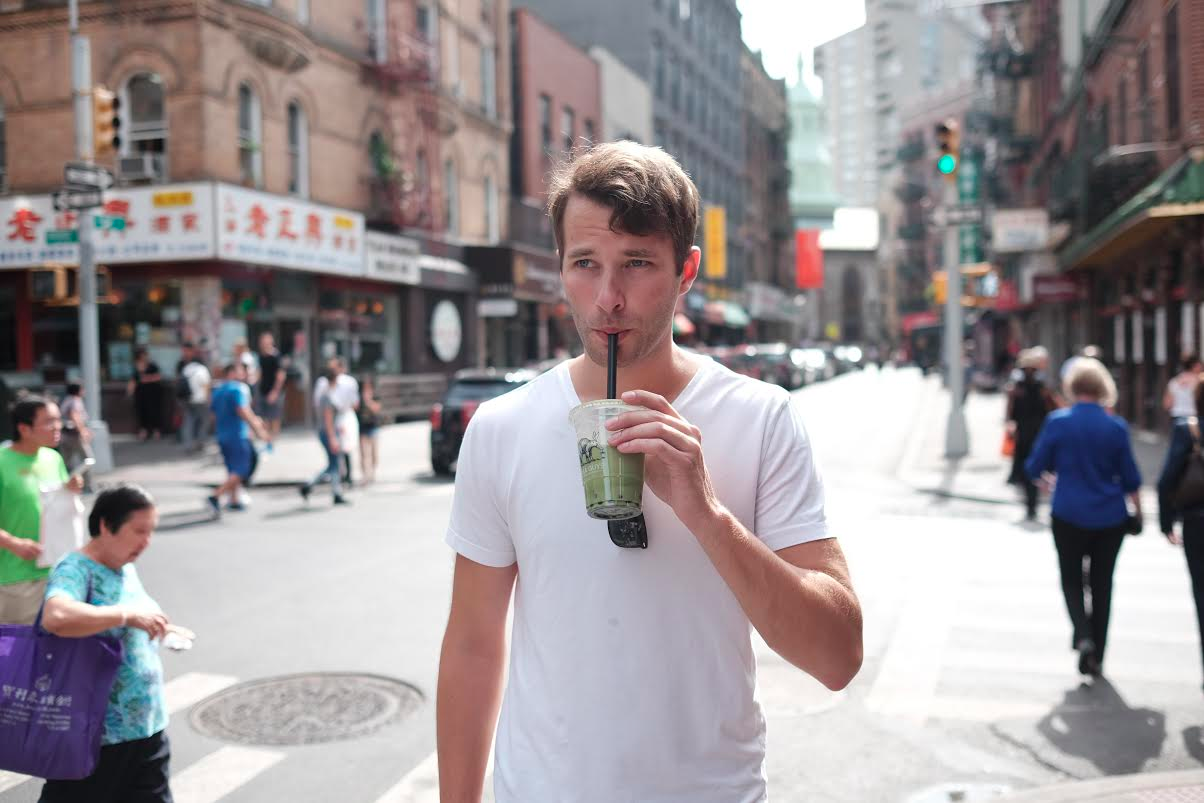
Bin and Andrew pause one last time before agreeing: “A lot of people have told us they came to San Francisco specifically to drink our boba, but our absolute favorite is seeing people come in with their suitcases.”
I tilt my head.
“It either means they had to get boba right away when they arrived or one last drink before flying home. And that’s how much we love boba. We still can’t believe we’ve started something that makes others feel the same way.”



